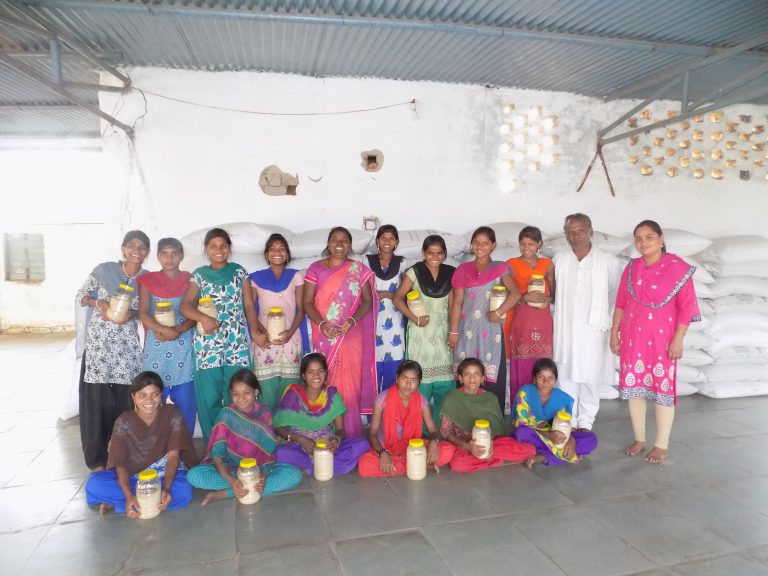Subtotal ₹0.00
No Widget Added
Please add some widget in Offcanvs Sidebar
Shopping cart
No Widget Added
Please add some widget in Offcanvs Sidebar
Please add some widget in Offcanvs Sidebar
Please add some widget in Offcanvs Sidebar
Sampark Sanstha’s ECCD initiatives in Jhabua district are
built on the belief that nurturing a child’s early years is key
to long-term development. Programs focus on integrated
early education, health, and nutrition for children under six.
By facilitating non-formal preschool education and child
-friendly learning environments, Sampark lays a foundation for cognitive and emotional development in tribal communities.
Health and nutrition services are embedded into ECCD. The organization facilitated the immunization of 3,030 infants and supported 1,706 institutional deliveries through collaboration with health departments and schemes like Janani Suraksha Yojana and Ladali Lakshmi Yojana. Trained Anganwadi workers play a pivotal role, receiving ongoing capacity-building support to ensure effective delivery of early childhood services.






Sampark Sanstha’s ECCD initiatives in Jhabua district are
built on the belief that nurturing a child’s early years is key
to long-term development. Programs focus on integrated
early education, health, and nutrition for children under six.
By facilitating non-formal preschool education and child
-friendly learning environments, Sampark lays a foundation for cognitive and emotional development in tribal communities.
Health and nutrition services are embedded into ECCD. The organization facilitated the immunization of 3,030 infants and supported 1,706 institutional deliveries through collaboration with health departments and schemes like Janani Suraksha Yojana and Ladali Lakshmi Yojana. Trained Anganwadi workers play a pivotal role, receiving ongoing capacity-building support to ensure effective delivery of early childhood services.



The reach of these interventions has been bolstered through the efforts of 118 trained Swasthya Sahelis and 118 dais (birth attendants). These women ensured the safe delivery of 2,400 children and facilitated immunizations for 7,230 women, significantly boosting maternal and child health coverage in remote areas.
Community sensitization has been a core component, with awareness campaigns engaging parents and caregivers on topics like hygiene, breastfeeding, emotional nurturing, and balanced nutrition. These efforts not only educate families but also mobilize community support for early childhood needs.



The reach of these interventions has been bolstered through the efforts of 118 trained Swasthya Sahelis and 118 dais (birth attendants). These women ensured the safe delivery of 2,400 children and facilitated immunizations for 7,230 women, significantly boosting maternal and child health coverage in remote areas.
Community sensitization has been a core component, with awareness campaigns engaging parents and caregivers on topics like hygiene, breastfeeding, emotional nurturing, and balanced nutrition. These efforts not only educate families but also mobilize community support for early childhood needs.
Village Health and Sanitation Committees (VHSCs), now active in 39 villages, have become vital mechanisms to ensure regular health services and medicine availability. They ensure community ownership and institutional continuity of ECCD services.
Sampark’s ECCD strategy is inclusive, scalable, and deeply rooted in community participation. By connecting health, education, and parental involvement, it ensures that every child, especially from marginalized communities, receives a healthy and stimulating start to life.






Village Health and Sanitation Committees (VHSCs), now active in 39 villages, have become vital mechanisms to ensure regular health services and medicine availability. They ensure community ownership and institutional continuity of ECCD services.
Sampark’s ECCD strategy is inclusive, scalable, and deeply rooted in community participation. By connecting health, education, and parental involvement, it ensures that every child, especially from marginalized communities, receives a healthy and stimulating start to life.
SAMPARK collaborated with 5,489 government schools, enrolling over 95,188 out-of-school children—85% of them girls. Quality education programs like “Gyan Ka Pitara” and “Bal Sabha” improved learning for 80,000+ children. Through trained School Management Committees (SMCs) and Education Volunteers (5,037), the initiative enhanced accountability and retention. Life skills sessions empowered girls, and over 90,000 children were protected from child labor, marriage, and abuse.
Government schools Partnership
Children mainstreamed into formal education, 85% girls
Meetings conducted, with 24,455 members trained
Quality Education Beneficiaries 60% girls
Life Skills & Bal Sabha: 63,673 girls engaged
Children reached; 5,037 education volunteers active
Support strong beginnings — nurture every child’s right to health, learning, and care for a brighter, inclusive future.